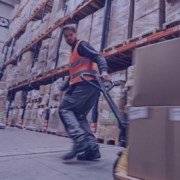Within the past decade, new research and manufacturing policies have brought environmental concerns to the forefront of consumers’ attention. Results from the CGS 2019 U.S. Consumer Sustainability Survey show that 68% of today’s consumers see sustainability as a deciding factor in whether or not to purchase a product. In 2019, products labeled sustainable accounted for as much as $114 billion in revenue, a 29% increase compared to 2013. From product assembly to shipping methods, there are several ways companies can integrate sustainability into their supply chain. However, while it may be tempting for companies to label products as sustainable, the Federal Trade Commission deals heavy fines for misleading and/or inaccurate labels.
In our commitment to both the environment and operational efficiency, Avalon Integration investigates new technologies and their benefits beyond the warehouse. Among these technologies, RFID tracking stands as one of the most promising resources in establishing sustainable practices with the supply chain. By providing true real-time visibility, RFID equips you with actionable intelligence into every detail of your operation to reduce environmental impact.
Creating the Green Warehouse, One Tag at a Time
Before choosing any particular RFID solution, it is important to consider tag composition and durability. Because they will face several sorts of environments even after application, RFID tags should be designed with strength in mind. Like is quality consumables, Zebra’s RFID tags are tested for continuous performance on a wide range of surfaces, so you do more than just can track more than inventory.
- Manage inventory to prevent overstocking – A common issue in the retail industry, overproduction can lead to wastefulness and product depreciation. By managing processed goods in real-time, companies can regulate assembly speed to match the market demand.
- Minimize unnecessary and inefficient transportation labor – Inaccurate orders require labor and money to rectify. RFID readers can verify loaded shipments to prevent unnecessary truck deliveries and additional CO2 emissions.
- Implement additional policies with greater visibility – Since RFID technology can provide a full overview of warehouse activity, gathered intelligence can be used to pinpoint bottlenecks, extraneous energy usage, and wasted storage space.
But RFID isn’t the only technology revolutionizing supply chains. Catch an up-close look of 2020s most prominent technologies at MODEX 2020 and join Avalon in exploring the next generation of efficient technology.
When it comes to lessening environmental impacts, small changes can go a long way. To see how RFID can enhance your operations, contact us for an in-depth assessment of your current workflow.













